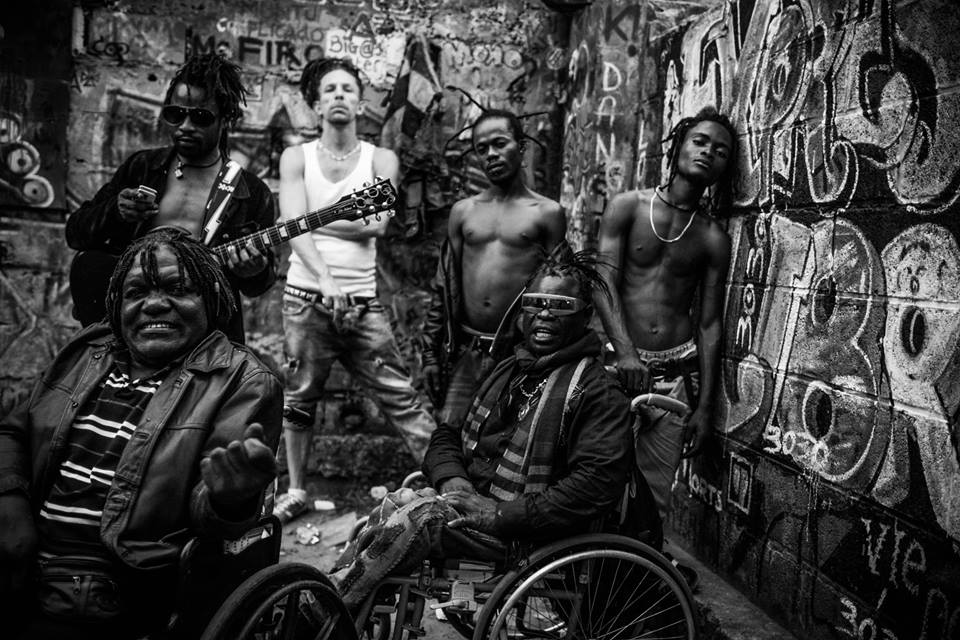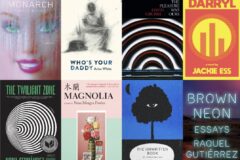The term “world music,” ick — a marketer’s desperate pitch more than tangible genre, suggesting either Yankee provincialism (there’s Americana, British rock, and, um, The World) or the earnest intentions of Putumayo compilations and didgeridoo fans. If the latter sounds appealing, the comforting tones of Angelique Kidjo with the Orchestre Philharmonique du Luxembourg await you (officially entitled Sings, out on 429 Records, it’s more easily recalled as Kidjo With Strings). But for those open to the possibilities of international pop and the rhythmic promise of one globe under a groove, the world beckons. Setting aside pop of the Euro-, K-, and J- varieties, let’s consider African artistry in both Sub-Saharan and Saharan form, from the streets of Kinshasa to the yawning spaces of rural Mali. And while Africa rightly remains the focus, side trips to the Caribbean, Brazil, Berlin, and West Bengal also await.
Mbongwana Star, From Kinshasa (World Circuit)
In which two former members of street performing outfit extraordinaire Staff Benda Bilili nab several Kinshasan youngbloods and French producer Liam Farrell to uncork a modification on Congolese tradition. And where the ad hoc instrumentation of their buddies Konono Nº1 suggest a busker’s paradise, Mbongwana Star dives deep into studio-enhanced possibilities. Soukous licks dart between digital fuzz, Cubain Kabeya’s drum kit shoves aside synth riffs, warped guitar hooks edge against rumba choruses, and white noize smudges all. From the rock of “Nganshé” to the roll of “Coco Blues,” two forward-looking cosmopolitans (plus friends) craft new directions in urban sound.
Fabiano Do Nascimento, Dança Dos Tempos (Now Again)
Choro, samba, forró, Hermeto Pascoal, Baden Powell: In 40 compact minutes, Nascimento — the twentysomething, Rio-based seven-string guitarist — gestures towards the great glory of Afro-Brazilian folk. Chops, he’s got them, but his precision remains something refreshingly casual, expert fingerwork surrounding a few offhand vocals from Fabiano himself and girlfriend Kana Shimanuki. Historians will note the return of São Paulo’s Airto Moreira, even if trap drummer Ricardo “Tiki” Pasillas proves this stripped-down trio’s anchor. Jazzy, left-of-center, and most definitely in the tradition.
Tal National, Zoy Zoy (Fat Cat)
Hard-touring fixtures on the West African circuit, Tal National honed their attack via five-hour sets unleashed upon audiences across Niger and beyond. With basically guitar and drums, it’s griot electricity plus percussion army — although a dose of caffeinated reggae spikes “Kadaje” — with little room for the comfort of Afropop’s lilt. Exhilarating and at times exhausting, the competing rhythms atop call-and-response choruses deliver a jittery math-rock fix cut with humanism, warning against fundamentalists of all stripes even as they embody the multicultural promise of their homeland.
Terakaft, Alone/Ténéré (Out Here)
Tinariwen, Tamikrest, Terakaft — all these “T for Tuareg” bands can prove confusing to newbies, so let’s make it simple(r): Terakaft is the harder-edged yin to Tinariwen’s NPR-approved yang, a basic quartet of guitar/guitar/bass/percussion that’s more committed to forward propulsion than acoustic reverie. “Anabayou” kicks off with Gary Glitter-ized “Black Skinhead” sleaze; “Karambani” gallops along like Duane Eddy; “Amidinin Senta Aneflas” stirs memories of the Clash. Above it all are Saharan —language of the most direct sort — lyrics about men facing the elements, digging of wells, camels crossing burning sands, the promise of hot tea. And always, those guitars, spiraling and rippling ever outwards.
Ata Kak, Obaa Sima (Awesome Tapes From Africa)
This backstory is, simply, pretty great. Ghana-born/Ontario-based Yaw Atta-Owusu cuts a seven-track album inside his apartment circa 1994, rapping in Twi dialect over computer synth. Nearly a decade later, he makes 50 cassette copies, roughly three of which he believes were sold. Afropop fan Brian Shimkovitz finds a bootlegged copy at a Ghanian roadside stall and digs it so much he starts a record label to release it because there’s nothing else like it, really: insistent rapping over tinny beats, cheap-o keyboard stabs, gooey melodies soaring over crude techno. The next time someone starts gushing over the latest private press find, introduce them to this bedroom talent.
Moritz Von Oswald Trio, Sounding Lines (Honest Jon’s)
Talk about an international summit. Hamburg techno royalty Moritz von Oswald (who claims both the Basic Channel and the House of Bismarck in his family tree) joins with fellow German Max Loderbauer and Chilean/Berliner microhouse jazzbo Ricardo Villalobos for a celebratory presentation of Mr. Tony Allen — that would be the rhythmic fulcrum of Nigerian strongman Fela Kuti’s many projects, here awarded ample space to revel in Afrobeat funk patterns. Think Africa ’70 minus the choruses and sax solos. If that doesn’t sound heretical to you, the groove awaits.
Protoje, Ancient Future (Indiggnation Collective/Overstand)
Dancehall singles are their own reward, so long as you love grinding without mercy, but even Vybz Kartel himself knows he’s not in the album business. This young rasta seems comfortable going full-length, and maybe that mastery is genetic: Oje Ken Ollivierre’s mother is Lorna Bennett (“Breakfast in Bed,” 1972), his father calypsonian Lord Have Mercy. Grounding his dancehall flow with hard roots tendencies, Protoje brings aboard both Chronixx and Mortimer, namechecks Jamaican MP Damion Crawford while sampling Zap Power’s “Bubblin’ Over,” and grabs a sparkling Prince Buster ska riddim to tell a story of heartbreak in 1971 Brixton. As for politics, he’s got ‘em: “Reparations and such.”
Debashish Bhattacharya, Slide Guitar Ragas From Dusk Till Dawn (Riverboat)
Call it Hindustani Slide: a North Indian permutation of the lap steel sonorities claimed by musicians from Oahu to the Mississippi Delta. Here, they’re brought to crackling intensity by a 50-ish Kholkata native. Spare percussion surfaces periodically, like on closing cut “Vasundhara,” which broadly hints at flamenco. But it’s mostly Bhattacharya and his 24-stringed chaturangui. Five songs, 75 minutes, and Romantic types may fumble about with descriptors like “meditational.” Hell no. This is bravura musicianship — if comparisons you need, think Jimmy Page’s “Black Mountain Side” turned white-knuckle ride.













